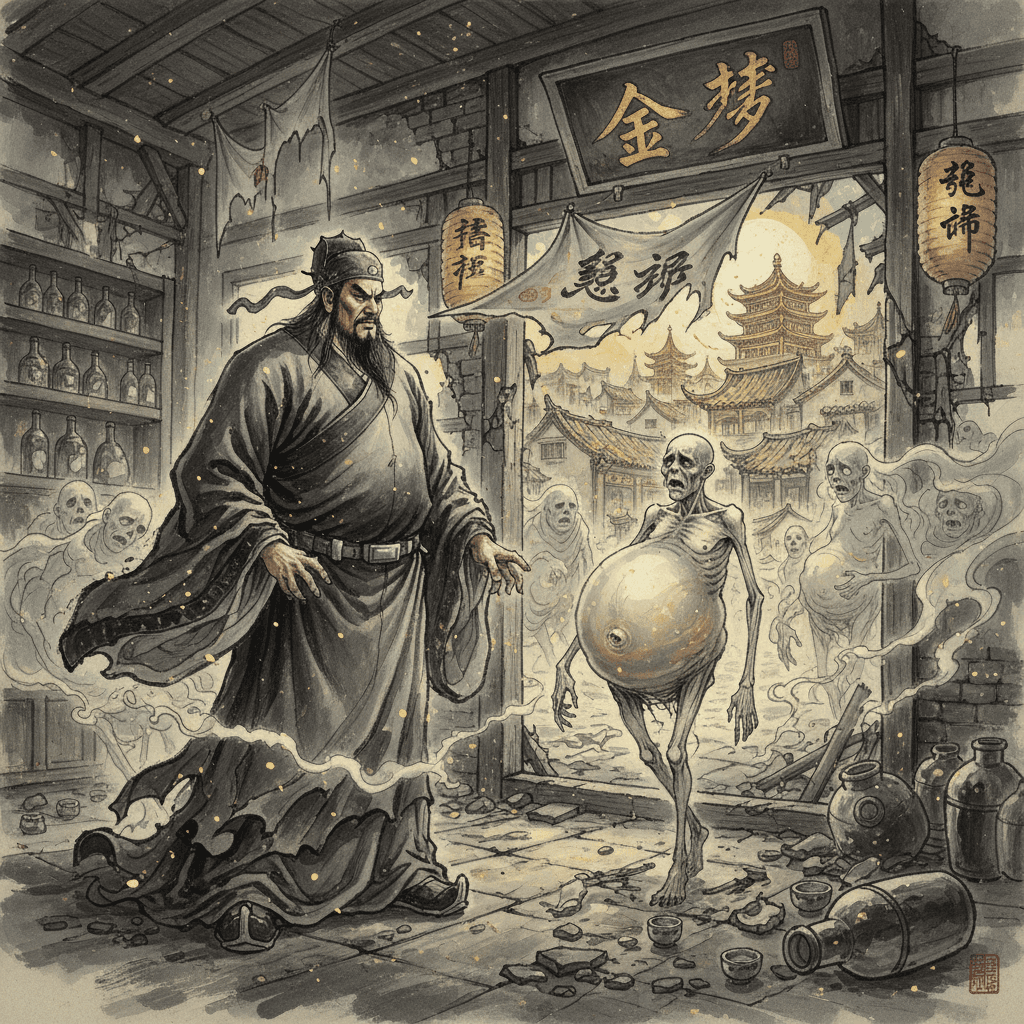The Pacification of Ghosts - Chapter Seven: The Wine Shop in Five-Li Village Collects the Poor Ghost
Five-Li Village (五里村) had once been a thriving market town on a major trade route. Now, Zhong Kui found it nearly deserted, with boarded shops and ...

Five-Li Village (五里村) had once been a thriving market town on a major trade route. Now, Zhong Kui found it nearly deserted, with boarded shops and empty streets. The only establishment still operating was a dilapidated wine shop at the village center.
"This is unnatural," Han Yuan observed. "The trade route is still active, the land is fertile, yet everyone here looks defeated, as if they've given up on life itself."
The villagers they encountered moved listlessly, their eyes empty of ambition or hope. When asked about their condition, they would only shrug and say, "What's the point? We're poor. We'll always be poor."
The wine shop was paradoxically busy despite the village's poverty. People who could barely afford food somehow found money for wine. The proprietor, a gaunt man named Qian, welcomed customers with an unsettling smile.
"Welcome, Lord Zhong Kui!" Qian greeted them. "Come to sample our special vintage? It's called 'Forget Your Troubles'—one cup and all ambitions fade away!"
Fu Qu was immediately suspicious. "People here can't afford rice, but they buy wine?"
"Oh, I accept alternative payments," Qian explained cryptically. "Dreams, hopes, ambitions—these have value too."
Zhong Kui's divine sight penetrated the wine shop's facade. Behind Qian stood a Poor Ghost (穷鬼), a massive, bloated spirit that fed on aspirations and ambitions. Every customer who drank the wine had their hopes literally consumed.
The Poor Ghost was grotesque—its body swollen with stolen dreams, its mouth constantly chewing on wisps of golden light that Zhong Kui recognized as human potential.
"So satisfying," the Poor Ghost mumbled between bites. "The dream of opening a shop—delicious! The hope for a better harvest—exquisite! The ambition to educate one's children—divine!"
The wine shop operated on a cruel economy. People would trade their ambitions for wine that numbed their despair. But without ambition, they couldn't improve their situation, leading to more despair and need for more wine.
"It's brilliant," the Poor Ghost boasted. "I don't make them poor in money—I make them poor in spirit. Without hope, even wealth becomes worthless. With hope, even poverty can be endured."
A young woman entered the shop, clutching a small pouch. "Master Qian, I need wine. I'll trade my dream of marriage. Who needs love when life is this hard?"
"No!" Zhong Kui intervened. "Don't surrender your future for temporary numbness!"
The Poor Ghost laughed, a sound like coins falling into an empty well. "You can't stop willing customers, Judge Zhong! They choose to trade their dreams. I force nothing!"
This was the dilemma—the Poor Ghost wasn't technically violating any cosmic laws. People voluntarily traded their ambitions. The ghost was a parasite, but an invited one.
"Besides," the Poor Ghost added, "look at them. Their dreams were impossible anyway. The merchant who wanted to rival the capital's traders—foolish! The farmer dreaming of educating his son to become a scholar—unrealistic! I'm doing them a favor by taking these painful hopes!"
Zhong Kui realized direct confrontation wouldn't work. Instead, he needed to restore hope to the village, making the Poor Ghost's "services" unwanted. But how could he return ambition to those who had voluntarily surrendered it?
Han Yuan suggested a clever plan: "What if we make poverty itself ambitious? Turn the Poor Ghost's nature against itself?"
They began spreading stories of a "Golden Poverty"—a state where being poor in material things led to richness in spirit, where simple living became a chosen philosophy rather than imposed suffering.
The Poor Ghost was confused. "What are you doing? You're making poverty seem... desirable?"
"No," Zhong Kui explained, "we're showing that poverty and ambition aren't opposites. One can be poor in wealth but rich in dreams. Your power comes from making people believe poverty equals hopelessness."
They organized the villagers to share their surrendered dreams openly, showing that everyone had traded away similar hopes. This created unexpected solidarity—people realized their dreams weren't foolish if everyone shared them.
As villagers began supporting each other's former dreams, something unexpected happened. The dreams the Poor Ghost had consumed began to rebel inside it, wanting to return to their owners.
"No! They're mine! Paid for!" the Poor Ghost screamed, clutching its bloated stomach.
But Zhong Kui revealed the truth: "Dreams can't truly be sold because they're part of the soul itself. You've been lending despair in exchange for borrowing hope. The transaction was always temporary."
The Poor Ghost began vomiting streams of golden light—all the dreams and ambitions it had consumed over the years, returning to their rightful owners.
As dreams returned, the village transformed. The merchant began planning new trade routes. The farmer started teaching his son to read. The young woman embraced her hope for love again.
The Poor Ghost, depleted and shrunken, begged for mercy. "Without feeding on dreams, I'll fade to nothing!"
"Then change your diet," Zhong Kui commanded. "Instead of feeding on surrendered dreams, nourish yourself on fulfilled ones. Help people achieve their ambitions, and feed on their satisfaction. Transform from the Poor Ghost to the Spirit of Contentment."
The ghost considered this. "But... that would mean actually helping humans succeed?"
"Yes. Your hunger becomes their motivation, their success becomes your sustenance. It's symbiosis instead of parasitism."
Reluctantly, the Poor Ghost agreed to try this new existence, beginning its transformation from dream-thief to dream-helper.
Continue reading: Chapter Eight: Defeated at Slippery Formation, Meeting the God of Poverty